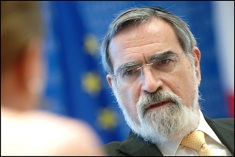“Judaism is God’s perennial question mark against the condition of the world.”

This is a quote from the book, To Heal a Fractured World, by Rabbi Lord Jonathan Sacks, Chief Rabbi of the British Commonwealth, who visited Atlanta last month. The particular reason for his visit was what was billed as the Happiness Summit, in which he participated with the Dalai Lama and three other religious dignitaries. They shared an ecumenical vision as well as their religiously specific ones.
I had been lucky enough to have had tea once with Rabbi Sacks and his gracious wife, now Lady Elaine, in their home in London two years ago–an unforgettable hour. I had read and admired his writings, as he, amazingly to me, had read and liked some of mine. There were great gaps between us, yet great common ground.
But I had not experienced his oratory gifts until this visit to Atlanta. I heard him speak first at Young Israel of Toco Hills, a modern Orthodox synagogue where he gave the Shabbos sermon, on the subject of Judaism’s role in the world. He did not quote his own book as I did above, but he made much the same point with great eloquence.
Here is a man who was knighted many years ago, who now sits in the House of Lords, who has socialized with the Queen and several prime ministers, and he said unequivocally that the Jews who get the greatest respect from others are those who completely embrace their Jewishness. Why?
His answer is that people understand what they owe the Jews. From the ethical edicts of the Torah to the laws of relativity and vaccines against polio, Jews have been able to stand outside the frequent complacency of the world and say, This is not quite right. Here is an idea about how to make it better.
Jews are not the only ones, and no one thinks they are. But they are over-represented among the people who make the greatest difference intellectually because they stand outside, because they ask the perennial questions, because they have learned for thousands of years to wonder, muse, and argue. Whether it’s in their blood or just in their culture, it is surely there.
At the Happiness Summit he shared the platform with the Dalai Lama, the presiding Bishop of the Episcopal Church, and a leading Muslim scholar. Before their very mixed audience, he acknowledged to their amusement that happiness is not the first word that comes to mind when you think of Jewish history. But he soon quoted Jacob, after his wrestling match with the angel: I will not let you go unless you bless me. His interpretation: In each bad thing there is a blessing, and we should not let go until we find it.
The Rabbi was in mourning for his mother, and had already lost his father, but he was finding the blessings in their lives, and even in their deaths, because the loss of one you love teaches you what a slender thing life is. “Sometimes all the pain and the tears lift you to a much higher and deeper joy.”
He also cited a story of Rabbi Levi Yitzkhak of Berdichev, who observed his fellow townspeople rushing around one day. Stopping one to ask why, and receiving the answer, “I’m running to make a living,” Levi Yitzkhak asked him how he could be so sure that what he wanted was in front of him; what if it was behind him and he needed to stop to let it catch up? This, Rabbi Sacks said, is the purpose of the Sabbath: “Sometimes we don’t need to pursue happiness. We just need to pause and let it catch up with us.”
He also talked about three approaches to physical pleasure: hedonism, asceticism, and the Jewish middle way, the way of Halakhah, the commandments, the law. These correspond to the worship of pleasure, the denial of pleasure, and the sanctification of pleasure. As for denial, he quoted Rav, the great Talmudic rabbi who said “that in the world to come, a person will have to give an account of every legitimate pleasure he or she deprived themselves of in this life. Because God gave us this world to enjoy.”
I’ll have more to say about Rabbi Sacks’s visit and his many contributions in another posting. I also wrote elsewhere about the general discussion in the Happiness Summit.

This question is only partially relevant perhaps, but have you read Hillel by Joseph Telushkin? It’s not the kind of book I normally read, but I enjoyed it.
Jack,
I’m a fan of Telushkin’s work generally, and I’ll be on the lookout for his book on Hillel.
Mel